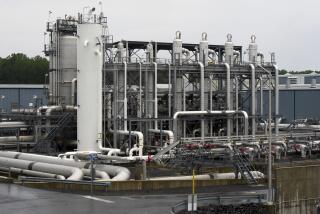U.S. Won’t Object to Gas Pipeline Through Iran
- Share via
WASHINGTON — Sending political signals to both Turkey and Iran, the White House has decided not to oppose construction of a $1.6-billion pipeline that would carry natural gas from Central Asia through Iran to Turkey, Clinton administration officials said Saturday, even though the project could be deemed a violation of U.S. economic sanctions against Tehran.
The decision is first and foremost, according to officials, a sign to Turkey that the United States wants to cooperate with and help the new secular government, headed by Prime Minister Mesut Yilmaz, that last month replaced a controversial Islamist-led government.
On a broader level, the move also signals to the Turkish people, who are likely to face elections within the year, that Washington prefers to deal with a secular government.
But the decision will also have the side effect of sending a smaller signal to Iran at a critical moment in the history of that country’s Islamic revolution, with the inauguration of President-elect Mohammad Khatami, a relative moderate, a week away.
The administration recently made secret overtures to Khatami as a first step to ending a generation of hostility stemming from the 1979 revolution. Khatami, who is largely responsible for an earlier relaxation of the revolutionary government’s strict Islamic practices, won a stunning upset victory in May over the regime’s favored hard-line candidate.
The financial gain could be enormous for economically troubled Turkey, which has lost billions of dollars in income since closing its oil pipeline from Iraq in 1990 because of U.N. sanctions against Baghdad. Iran’s income would be limited to transit fees and be of comparatively minor benefit.
But the pipeline would potentially give Iran a role in the development of vast energy reserves in Central Asian nations. Virtually every major oil company in the world is prospecting in Central Asia’s deserts, which are thought to contain major oil reserves.
The pipeline plan marks one of the first times since 1979 that Iran has been permitted to participate in a major international energy project.
The pipeline would transport natural gas from Turkmenistan, a former Soviet republic that has been described as the Kuwait of Central Asia. But the landlocked country’s existing oil infrastructure was built during the Cold War, and all its pipelines still go to Russia.
The United States has long sought ways to loosen Russia’s grip on the huge Caspian Sea energy field, which is second only to the Persian Gulf in size. The potential market for Turkmenistan is far greater than just Turkey--eventually the pipeline could be linked to Middle Eastern and European networks.
A senior administration official described the White House decision as a “win-win” move.
“The Turks have a huge need for gas,” an Energy Department official said.
The decision may help reverse increasing criticism from Turkey’s parliament and its people over the costly use of their country as a staging point for U.S.-led operations against Iraq.
The senior administration official said the decision “is more related to Turkey. It reflects our desire to develop strong relations with this Turkish government.”
“The primary intent is not to be an easing toward Iran,” he said. “It is really a side effect. But if Iran wants to interpret it as a signal, that’s its decision.”
The move comes at a time when Washington is probing the possibility of opening a dialogue with the new Iranian government. Through Saudi Arabia and other allies, the White House has recently outlined to Iran what moves the United States believes are essential to begin such a dialogue.
The U.S. decision not to oppose the pipeline was made after Turkey offered assurances that Iran would not use the pipeline to export its natural gas. Those assurances opened the way for the White House to decide that the pipeline would not be a violation of the Iran-Libya Sanctions Act, which requires the president to impose sanctions on foreign firms that invest $40 million or more a year in energy enterprises in either nation.
The issue, however, was hardly clear-cut. Although the sanctions act does not mention pipelines that transport oil or gas from other countries across Iran, the project nonetheless could have been deemed a violation because it will generate income for Tehran, officials said.
More to Read
Get the L.A. Times Politics newsletter
Deeply reported insights into legislation, politics and policy from Sacramento, Washington and beyond. In your inbox twice per week.
You may occasionally receive promotional content from the Los Angeles Times.











